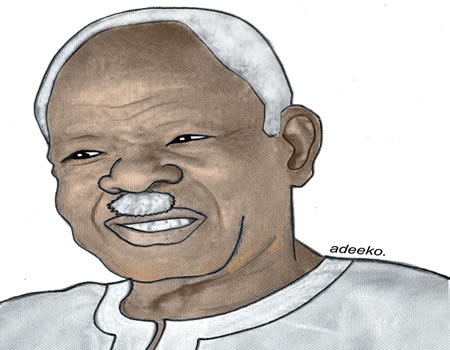
ADEBAYO: The Commander-in-Chief and myself agreed…..
Ojukwu: No: we have not appointed anyone Commander-in-Chief.
Adebayo: Can we not appoint a Commander-in-Chief now?
Ojukwu: We will see about that later……….
These was the brief exchange between Colonel Robert Adeyinka Adebayo (March 9 1928- March 8 2017), Military Governor of Western Region and Lt. Col. Udumegwu Ojukwu (1933-2011), Military Governor of Eastern Region during the peace meeting held by senior military officers in Aburi, Ghana between January 4 and 5, 1967 to resolve the Nigerian crisis. At the time he was appointed Military Governor of Western Region on August 4 1966 by Lt.Colonel Yakubu Gowon (82) to succeed Lt. Colonel Francis Adekunle Fajuyi (1926-1966), Colonel Adebayo was the most senior military officer in the country. At that time, his six other superiors were either assassinated or in exile including Major General Johnson Thomas Umunnakwe Aguiyi Ironsi(1924-1966), Brigadier General Samuel Adesujo Ademulegun, Brigadier General Zakariya Maimalari, Brigadier Babafemi Olatunde Ogundipe(1924-1971) and Colonel Raph Sodeinde. Throughout his tenure as Military Governor which ended in April 1971 he conducted himself in power not with ruthlessness but as a pacifier. He loved people, he loved life and he had a large heart.
The five controversial issues that he faced during his tenure and the way he handled those issues no doubt portrayed him as a man of peace. These are the Agbekoya Parapo crisis (1968-1969) during which the farmers revolted, the appointment of Oba Lamidi Adeyemi III(78),CFR.as the Alaafin of Oyo in November 1970 when he succeeded Alaafin Gbadegesin Ladigbolu, the Occupation of ‘Northern’ soldiers in Western Region, the ever constant looming image and shadow of Chief Obafemi Awolowo who was at that time the most powerful Politician in the country and the Post War reconstruction in Western Region. At the time he took over as Governor, the percentage of Yoruba in the Nigerian Army including in the senior military cadre, was less than five per cent and it became worse that time that no military Yoruba officer was posted to that region to serve. This issue is best understood if you read a book, Architecturing A Destiny, by Major General James Oluleye(1930-2009).
Governor Adebayo referred to it in a speech which he delivered in Ibadan on May 3 1967 when he declared: “The training depot for the Army, promised in April has now been commissioned and the monthly intake of Yorubas into the Nigerian Army has now been raised to 200 with the likelihood of further increase in the monthly intake of trainees. I know that this will go some way towards meeting the genuine fears of the people of this region as it will afford us the facility for improving the strength of Yoruba personnel within the Nigerian Army and make for harmonious relationship between us and our fellow Nigerians in other regions. The No. 2 command of the Nigeria Army has now been established at Ibadan on the basis of equality of status with similar formations in other parts of the country. Plans are in hand to fill the yawning gap in the personnel of the Nigerian Police contingent within Western Nigeria. To this end efforts will be made to provide additional physical facilities.”
By August 1966, the two major contemporaries of Chief Obafemi Jeremiah Awolowo (1909-1987) had been assassinated, namely Sir Ahmadu Bello (1909-1966) and Sir Abubakar Tafawa Balewa(1912-1966) while Dr. Benjamin Nnamdi Azikiwe (1994-1996) was in exile. That gave Chief Awolowo the opportunity to transverse the political field almost all alone in an extremely military era. On August 3, Lt. Col. Gowon released Chief Obafemi Awolowo from Calabar prison and throughout the tenure of Governor Adebayo, he governed under the shadows of Chief Obafemi Awolowo. He even presided in the unprecedented selection of Chief Awolowo as the leader of the Yorubas on August 12 1966 in Ibadan.
In his address to the joint conference of obas and leaders of western Nigeria on October 12 1966, he declared: “You will, I am sure, be interested to know that my crusade for internal UNITY among the Yoruba as a prelude to national unity has gone on apace. One significant development in this connection the endorsement of the Oba, Chiefs, and representatives of the people of Lagos, of Chief Obafemi Awolowo as Leader of the Yoruba. Nevertheless, we must not relax or slacken our determination to remain united as one people with a common language, common ancestry, common culture, and common destiny.” He then matched his words with action by releasing all political prisoners previously held in detention and this created an atmosphere of peace in the region at that time.
General Adebayo’s childhood friend, Bishop Joseph Adetiloye (1929-2012) whose village in Odo-owa in Ekiti state is not far from Iyin-Ekiti, the home town of General Adebayo, told him while preaching during his eightieth birthday at Archbishop Vining Memorial Church in Ikeja that General Adebayo was a “lucky man” whom God has been kind to. Only a lucky man could have passed through what General Adebayo passed through in life until his lifeless body was brought to Lister Hospital in Ikeja, owned by Dr. Amole, without being sick on the morning of March 8 2107.
Just as he accepted to serve under Lt. Colonel Yakubu Gowon, he accepted all that came to him in life with enthusiasm and with peace of mind. Dr. Henry Alfred Kissinger(93) wrote in April 2012 that “Conflict is a choice not, by necessity”. General Adebayo was a man of peace. In the words of General Douglas Mac Arthur in his address to the American Congress on April 19 1951”Old soldiers never die, they just fade away”. And like an old soldier, Major General Adeyinka Adebayo has faded away.
Teniola, a former director at the Presidency, lives in Lagos.
END

Be the first to comment